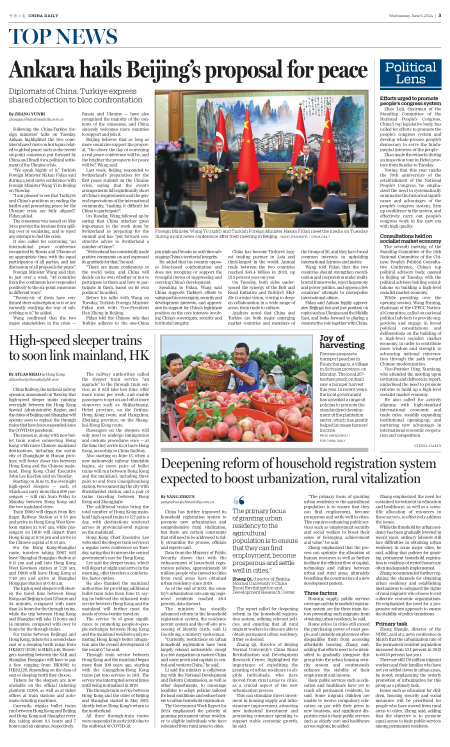China Railway, the national railway operator, announced on Tuesday that high-speed sleeper trains running overnight between the Hong Kong Special Administrative Region and the cities of Beijing and Shanghai will operate soon to replace the through trains that have been suspended since the COVID-19 pandemic.
The measure, along with new bullet train routes connecting Hong Kong with more Chinese mainland destinations, including the scenic city of Zhangjiajie in Hunan province, will foster closer ties between Hong Kong and the Chinese mainland, Hong Kong Chief Executive John Lee Ka-chiu said on Tuesday.
Starting on June 15, the overnight high-speed sleepers — each of which can carry more than 600 passengers — will run from Friday to Monday between Hong Kong and the two mainland cities.
Train D909 will depart from Beijingxi Railway Station at 8:13 pm and arrive in Hong Kong West Kowloon station at 8:47 am, while passengers on D910 will depart from Hong Kong at 6:24 pm and arrive in the Chinese capital at 6:53 am.
For the Hong Kong-Shanghai route, travelers taking D907 will leave Shanghai Hongqiao Station at 8:15 pm and pull into Hong Kong West Kowloon station at 7:29 am, and D908 will leave Hong Kong at 7:49 pm and arrive at Shanghai Hongqiao Station at 6:45 am.
The high-speed sleepers will shorten the travel time between Hong Kong and Beijing to just 12 hours and 34 minutes, compared with more than 24 hours for the through trains, while the trip between Hong Kong and Shanghai will take 11 hours and 14 minutes, compared with over 19 hours for the through trains.
For trains between Beijingxi and Hong Kong, tickets for a second-class seat or a sleeping berth range from HK$937($120) to HK$1,448. Passengers traveling between the SAR and Shanghai Hongqiao will have to pay a fare ranging from HK$682 to HK$2,128, depending on the class of seat or sleeping berth they choose.
Tickets for the sleepers are now available on the official ticketing platform 12306, as well as at ticket offices at train stations and automatic ticketing machines.
Currently, regular bullet trains run between Hong Kong and Beijing and Hong Kong and Shanghai every day, taking about 8.5 hours and 7 hours and 49 minutes, respectively.
The railway authorities called the sleeper train service "an upgrade" to the through train service, as it will take less time, offer more trains per week, and enable passengers to get on and off at more stopovers such as Shijiazhuang, Hebei province, on the Beijing-Hong Kong route, and Hangzhou, Zhejiang province, on the Shanghai-Hong Kong route.
Passengers on the sleepers will only need to undergo immigration and customs procedures once — at the time they arrive in or leave Hong Kong, according to China Railway.
Also starting on June 15, when a new nationwide railway timetable begins, six more pairs of bullet trains will run between Hong Kong and the mainland, including three pairs to and from Guangzhoudong station, two connecting the city with Shenzhenbei station, and a pair of trains traveling between Hong Kong and Zhangjiajie.
The additional trains bring the total number of Hong Kong-mainland high-speed trains to 127 pairs a day, with destinations scattered across 16 provincial-level regions on the mainland.
Hong Kong Chief Executive Lee welcomed the sleeper train service at a regular news conference on Tuesday, saying that it mirrors the central government's care for Hong Kong.
Lee said the sleeper trains, which will depart at night and arrive in the morning, offer travelers a comfortable, faster option.
He also thanked the mainland authorities for providing additional bullet train rides from June 15, saying he believed the enhanced train service between Hong Kong and the mainland will further meet the needs of cross-border travelers.
The service "is of great significance to promoting people-to-people exchanges between Hong Kong and the mainland residents and promoting Hong Kong's better integration into the overall development of the country", he said.
Through train service between Hong Kong and the mainland began more than 100 years ago, starting with the Guangzhou-Hong Kong trains put into services in 1911. The service was interrupted several times until being normalized in 1979.
The through-train service between Hong Kong and the cities of Beijing and Shanghai started in May 1997, shortly before Hong Kong's return to the motherland.
All three through-train routes were suspended in early 2020 due to the outbreak of COVID-19.
atlasshao@chinadailyhk.com

